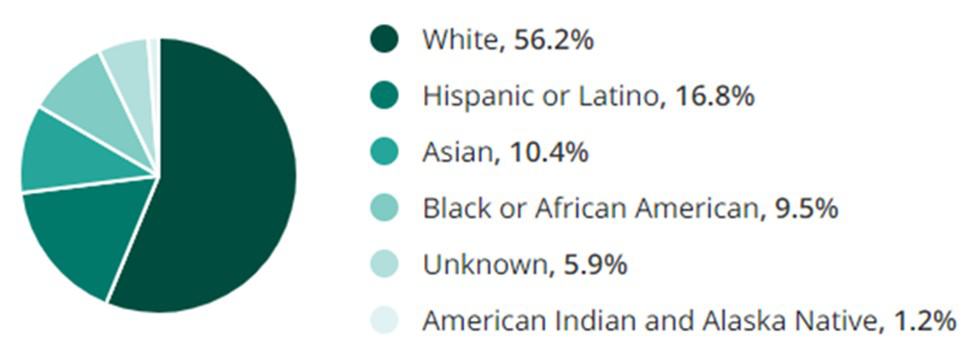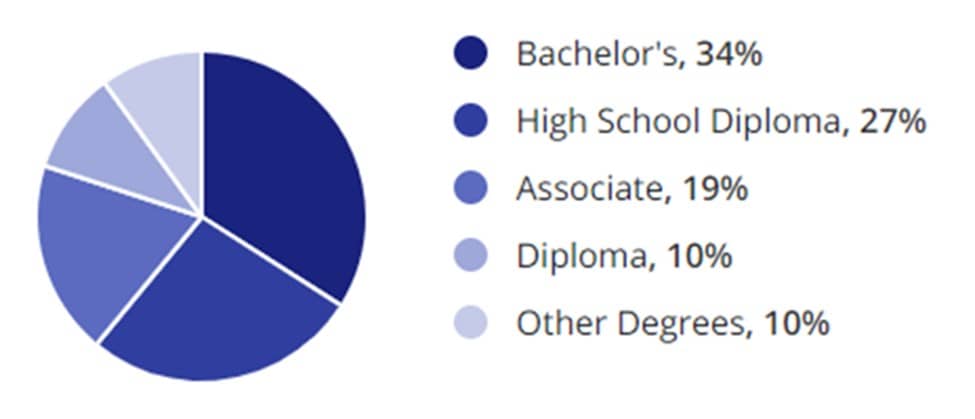Welcome to your ultimate guide for launching or advancing your career in quality control. In today’s competitive job market, being informed is more than just an advantage; it’s necessary. This guide will be your roadmap to the vast landscape of quality control jobs, from understanding educational requirements and areas of expertise to exploring current hiring trends and necessary skills. Quality control is a vital function in virtually all industries, ensuring products and services meet stringent standards of excellence. It is a field that demands precision and commitment and values diversity and inclusion, making it a rewarding career path for those who aspire to make a significant impact.
Whether you’re a new graduate exploring your career options or a seasoned professional seeking new challenges and opportunities, this guide offers valuable insights and tools to help you navigate your career journey. You’ll discover how quality control is critical in various industries, understand the workplace’s demographic trends, and learn about this field’s salary potential and growth outlook. Additionally, we highlight essential resources and tips for continuous professional development and career advancement.
Embarking on a career in quality control means becoming part of a community dedicated to maintaining the highest standards in every product and service. It’s about contributing to a culture of excellence and continuous improvement. Let this guide be your first step toward a successful career in quality control. Ready to start?
Educational Requirements
Launching a successful career in quality control starts with the proper educational foundation. Depending on the industry, the requirements can vary, but here’s what you generally need:
- Relevant Degree: A bachelor’s degree in engineering, computer science, or a field related to a specific industry (like biology for pharmaceutical quality control) is often a minimum requirement.
- Certifications: Enhance your qualifications with certifications such as Certified Quality Improvement Associate (CQIA) or Certified Software Quality Engineer (CSQE). These certifications bolster your resume and provide up-to-date knowledge in the field.
- Technical Training: Hands-on training in specific quality control methods or software greatly benefits technical fields, such as manufacturing or software quality control.
Education doesn’t stop at college. Ongoing learning, through workshops or online courses, keeps quality control professionals ahead in their field.
Areas of Expertise
The field of quality control is vast, with a range of areas where professionals can specialize. Understanding these can help you align your career path with your interests and strengths. Here are some key areas:
Manufacturing:
- Process improvement and optimization
- Product testing and inspection
- Supply chain quality management
Software and Technology:
- Software testing and debugging
- Quality assurance (Q.A.) in software development
- User experience (UX) evaluation
Healthcare and Pharmaceuticals:
- Regulatory compliance and standards
- Drug and medical device testing
- Lab quality control and safety
Food Safety:
- Sanitation and food safety standards
- Supply chain oversight
- Product quality assessments
Each area demands specific skills and knowledge to ensure products or services meet the necessary quality standards. For example, quality control manager jobs in manufacturing might focus on process optimization, whereas in software, the emphasis may be on identifying and fixing bugs. Whether it involves collaborating remotely or working hands-on in a lab, expertise in specific areas of quality control can lead to fulfilling careers across industries.
Demographics in the United States
Understanding the demographic landscape of quality control jobs in the United States can provide insightful perspectives into the diversity and inclusivity of the field. Here’s a closer look:
Ethnicity/Race:
- White: 56.2%
- Hispanic or Latino: 16.8%
- Asian: 10%
- Black or African American: 9.5%
- Unknown: 5.9%
- Native American and Alaska Native: 1.2%
This distribution highlights the efforts toward diversity within the field. However, it also underscores the need for an ongoing effort to support diverse teams to foster innovative solutions and ensure comprehensive quality checks.

Gender:
- Male: 54.5%
- Female: 45.5%
The nearly balanced gender distribution in quality control jobs reflects ongoing efforts to ensure equal opportunities and representation across all levels of the profession.

Age:
- The average age of professionals in quality control jobs is over 40 years and recently there has been a large influx of younger workers in the field.
Quality control attracts professionals from a wide age range. Young professionals often bring fresh perspectives and adaptability, while experienced individuals contribute in-depth knowledge of quality methodologies and compliance.
Inclusivity and diversity are central to the quality control sector, with every demographic group playing a crucial role in upholding safety, efficiency, and reliability across various industries. Understanding these demographics will be vital to fostering an environment where everyone can flourish as the field evolves.

Salary Trends
Salary figures in quality control vary widely based on experience, specialization, and geographic location. However, understanding the broader trends can give aspiring and current professionals an idea of what to expect. Here’s a snapshot of salary trends in the realm of quality control jobs:
- Entry-level positions typically start around $45,000 annually.
- Mid-career quality control professionals can earn between $60,000 and $85,000.
- Senior roles, such as Quality Control Compliance Managers, can see salaries exceeding $120,000.
- Specialized positions, for example, those in pharmaceuticals or cutting-edge technology sectors, often command higher salaries due to the critical nature of the work and required expertise. Explore our Ultimate Guide to Pharmaceutical Jobs for a better look at these opportunities.
It’s important to note that besides the base salary, many quality control jobs offer additional compensation in bonuses, profit sharing, and benefits, which can significantly enhance the total compensation package. Moreover, specific regions or cities might offer higher salaries due to the cost of living or demand for skilled professionals in those areas. As the industry evolves, staying informed on the latest salary trends can help professionals negotiate better salaries and choose positions that align with their career goals.
Hiring Trends
Industry needs, technological advancements, and regulatory changes continuously shape the demand for quality control professionals. Here are the current trends influencing hiring in this field:
- Steady Growth: The overall need for quality control experts remains constant, with specific sectors like technology and healthcare experiencing higher demand due to stringent quality standards and regulatory requirements.
- Specialization: Employers increasingly seek candidates with specialized expertise in software quality assurance or pharmaceutical regulations to meet specific industry needs.
- Remote Work Opportunities: The rise of remote work has also reached the quality control realm, with more companies offering flexible working options for roles that do not require physical presence, such as data analysis or software testing.
- Emphasis on Soft Skills: Besides technical prowess, soft skills like teamwork, communication, and problem-solving are highly valued, reflecting the collaborative nature of quality control work.
For those entering the job market or considering a career shift, these trends suggest a promising outlook for quality control roles. Staying informed on industry developments and enhancing technical and soft skills can favor candidates in the job search. Additionally, leveraging resources such as ProClinical Infographics can offer valuable career advancement tools and insights.
As companies prioritize quality in all aspects of their operations, the role of quality control professionals will remain indispensable. Keeping abreast of these hiring trends can help job seekers and those looking to advance in their quality control careers align their skills and experiences with market demands for a successful career trajectory.
Education Levels
The education level required for a career in quality control can vary based on the specific role and industry. However, there are commonalities in educational requirements across the board. Here’s what you need to know:
- Bachelor’s Degree: Most quality control positions require at least a bachelor’s degree in a field relevant to the industry, such as engineering, computer science, or business positions.
- Advanced Degrees: For higher-level or more specialized roles, such as a quality control director, an advanced degree like a Master’s or PhD may be necessary.
- Continuous Learning: Given the rapid pace of technological and regulatory changes, ongoing education through certifications, workshops, and courses is vital for career advancement.
For professionals in the quality control field, staying up-to-date on the latest advancements and maintaining relevant certifications can make a significant difference in career progression. Investing in your education is not only about meeting job requirements; it’s about enriching your knowledge base and enhancing your value to employers.
Whether you are starting your career or looking to navigate the opportunities for growth in business and strategy planning, understanding the education levels required in your field helps you make informed decisions about your professional development.

Skills in Demand
In the dynamic field of quality control, specific skills are particularly sought after by employers. These skills ensure that professionals can effectively manage quality across various products and services. Here are the top skills in demand:
Technical Skills:
- Statistical Analysis: Ability to apply statistical methods to monitor and improve process control.
- Regulatory Knowledge: Understanding relevant industry regulations and standards is especially critical in pharmaceuticals and food safety.
- Software Proficiency: For those in tech-related quality control, proficiency in quality assurance software and testing tools is essential.
Soft Skills:
- Problem-Solving: Identifying issues and devising practical solutions is critical to maintaining quality standards.
- Communication: Clear articulation of quality standards and issues to team members and stakeholders.
- Attention to Detail: Meticulousness in reviewing products and processes to ensure they meet quality guidelines.
Leadership Skills:
- Project Management: Leading and managing projects to improve quality control processes.
- Team Leadership: Directing and motivating teams to achieve quality objectives.
Professionals who cultivate a blend of these technical, soft, and leadership skills are well-positioned for career advancement in quality control. Continuous skill development enhances job performance and opens doors to higher responsibility roles, such as quality control manager jobs. In this industry, where quality is a top priority, the need for skilled professionals to consistently meet standards is ongoing.
Current & Future Quality Control Jobs Outlook
The outlook for quality control jobs remains solid and promising, driven by ongoing demands for quality assurance across all sectors. Here’s what the current and future landscape looks like:
Stable Demand
Quality control is pivotal in ensuring product and service excellence, making it a crucial function in industries ranging from manufacturing to tech and healthcare. The constant need for compliance and quality improvement means a steady demand for skilled quality control professionals.
Emerging Technologies
- Automation and A.I. are revolutionizing quality control processes, creating opportunities for professionals skilled in these technologies.
- Integration of quality control with big data analytics presents new avenues for predictive quality assurance strategies.
Specialization Opportunities
As industries evolve, there’s a growing need for specialists in areas like regulatory compliance, particularly in the pharmaceutical and food safety sectors. This trend opens new pathways for professionals to deepen their expertise and take on more focused roles.
Globalization and Remote Work
The global nature of business and the rise of remote work expand opportunities for quality control professionals to work with international teams, emphasizing the importance of cross-cultural communication and collaboration skills.
The future for quality control jobs is not only bright but also diverse. With a steady demand for skilled practitioners and the emergence of new technologies and specializations, career opportunities in quality control are expansive. Professionals who stay ahead of industry trends and continuously update their skills will find themselves well-positioned to capitalize on the various avenues for career growth in quality control.
FAQ’s
What degree is best for a career in quality control?
Most quality control positions typically require a bachelor’s degree in a relevant field, such as engineering, computer science, or biology, but specialized roles might require further qualifications or certifications.
Can I work in quality control without a technical background?
While many quality control jobs are technical, there are roles focused on process improvement, compliance, and documentation that might not require a technical degree but rather a strong understanding of industry standards and attention to detail.
Are quality control jobs suitable for remote work?
Many aspects of quality control, especially those in software and data analysis, are suitable for remote work. However, roles that require physical inspection or testing may necessitate on-site presence.
How can I advance my career in quality control?
Advancement can be achieved by gaining additional certifications, specializing in high-demand areas of quality control, developing leadership skills, and staying updated with industry trends and technological advancements.
Is there growth in the quality control field?
Yes, the field of quality control is expected to grow steadily, fueled by the ongoing need for product and service quality across various industries. Emerging technologies also offer new opportunities for innovation and specialization in the field.
Additional Resources
Finding the right resources can significantly enhance your understanding and skills in quality control. Below are some essential resources to guide you on your journey:
- American Society for Quality (ASQ): ASQ offers a wealth of information on certifications, training, and networking opportunities for quality control professionals.
- U.S. Food and Drug Administration (FDA): The FDA website is crucial for those in food safety and pharmaceuticals, providing updates on regulations and industry standards.
- International Organization for Standardization (ISO): Understanding ISO standards is fundamental for quality control professionals. The ISO website provides detailed information on various quality management standards.
- National Institute of Standards and Technology (NIST): NIST offers resources and tools for improving quality control processes and compliance with industry standards.
These resources can be handy for newcomers and seasoned professionals in quality control. Leveraging them can help you stay informed, enhance your credentials, and connect with other professionals in the industry.
Conclusion
Beginning or advancing within a quality control career is rewarding and challenging. With the right educational background, specialized skills, and an understanding of current market trends, professionals in this field can look forward to a dynamic and fulfilling career path. The diversity in demographics and the inclusivity within the quality control community further enrich this profession, making it a promising choice for those passionate about ensuring excellence in products and services across industries.
As you navigate your career in quality control, remember the importance of continuous learning and staying connected with industry trends and advancements. Our job board can significantly enrich your job search and career growth by connecting you with diverse opportunities and resources tailored to your needs. Take the next step in your professional journey today with Diversity Employment!




